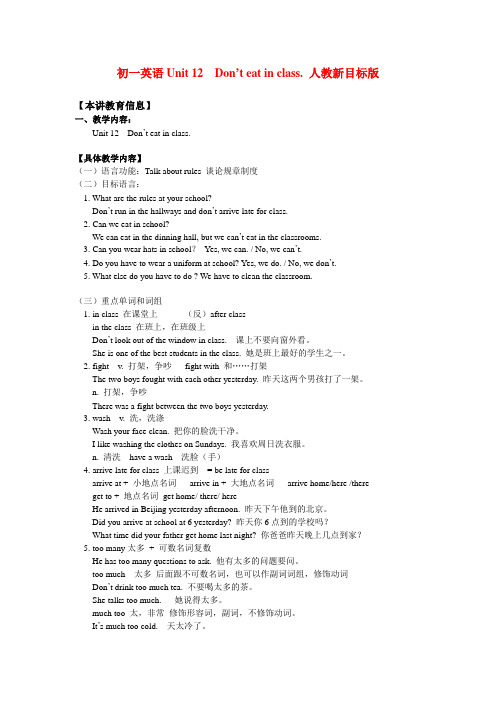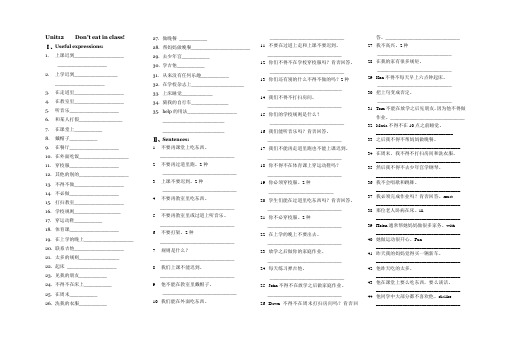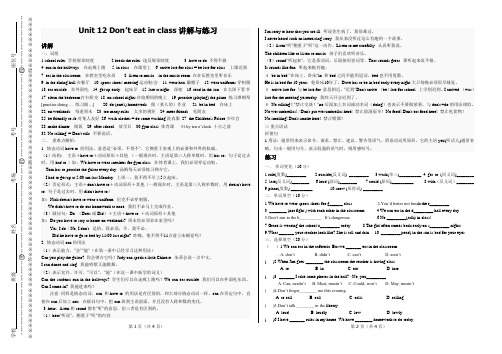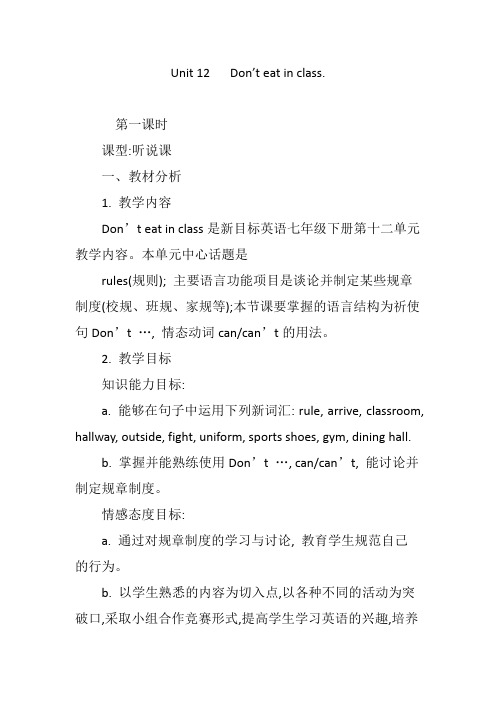英语:Unit-12-Don't-eat-in-class语法复习(人教新目标七年级下)
英语:Unit 12 Don’t eat in class单元课件(人教新目标七年级下)Section A

What do you know about the school rules?
Don’t eat in the classrooms.
What do you know about the school rules?
Don’t listen to music in the classrooms or the hallways.
PAIRWORK
Can we fight, Alex?
No, we can’t.
PAIRWORK
Can we listen to music in the music room, Alex?
Yes, wewe eat outside, Alex?
Yes, we can.
Unit 12
Don’t eat in class.
Section A
What do you know about the school rules?
Don’t arrive late for class.
What do you know about the school rules?
Don’t run in the hallways.
Fill in the blanks with the correct words in the box. Mary, you don’t have to wear a uniform .
Homework
Do you have any rule in your class? What are they? Write them down.
Activity
1. √ 2. 3. 4. 5. 6.
√ √ √ √
listen to music in the classrooms or hallways eat in the classrooms wear a hat listen to music outside fight listen to music in the music room eat in the dining hall eat outside
英语:Unit_12_Don’t_eat_in_class复习课件(人教新目标七年级下)

4. I like the party so much, but I ___ go home. It’s too late. A. must B. have to C. may D. can 5. Does Linda ___ to go to school on weekends? No, she ___. A.have, don't B. has, doesn't C. have, doesn't D. has, haven’t
Don’t sit down. Don’t come in . Don’t eat in class.
Don’t listen to music outside.
5. Do your homework at school.
Don’t do your homework at school.
特殊情况: 特殊情况: 否定 1.Please have a seat. 1.Please don’t have a seat . 2.David, pay attention. 否定 2.David, don’t pay attention. 3.Be quiet. 否定 3.Don’t be quiet. 4.Let’s go home together 否定
7.放学后我不能和朋友玩。 放学后我不能和朋友玩。 放学后我不能和朋友玩 I can’t meet my friends after school. 8. 在上课日晚上我不能看电视 I can’t watch TV on school nights. 9.过会我必须去少年宫学钢琴。 过会我必须去少年宫学钢琴。 过会我必须去少年宫学钢琴 Later I have to go to the Children’s Palace to learn the piano. 10.我没有任何乐趣。 我没有任何乐趣。 我没有任何乐趣 I never have any fun. I1. 我必须帮妈妈做晚饭。 我必须帮妈妈做晚饭。 I have to help my mother make dinner.
人教新目标版英语七下《Unit 12 Don’t eat in class》word教案

Unit 12 Don’t eat in class?课型:听说课课时:The first period (Section A 1a-2c)【学习目标】学习用祈使句和情态动词can、can’t谈论校园规则【情感目标】学会自觉遵守校规校纪,对校规校纪提出合理建议。
【学习重点】祈使句和情态动词can、can’t的用法;有关校规的各种表达。
要掌握的动词及动词短语:arrive late for class, listen to music in the classrooms or the hallways, fight with, run in the hallways, eat in the classroom( dining hall, outside), wear a hat in a class.【学习难点】arrive; late; make sb. +adj.Learning proceduresI. Preview. 1. Turn the following into Chinese.1)上课时不要吃东西。
2)不准在教室里或走廊里听音乐。
3)上课不准迟到。
4)不要打架。
5)不要在走廊里跑。
6)我们可以去外面听音乐?7)在课上你们能戴帽子吗?8)你们的校规是什么?II. Learning activities in class1. Learn some school rules in different ways. (It depends)2. Listen to 1b again and fill in the blanks. What rules do they break?Names What rules do they break?PeterSelinaNick3. After listening to 2a and 2b, write from memory what Alex and Cindy can do and what they can’t do.what they can do:_____________________________________________________________________________________________________________________________what they can’t do:______________________________________________________________________________________________________________________________4. Pairwork 场景:假设你到一所新学校上学,你要了解校规、班规,请表演两人一组对话。
七年级英语Unit 12 Don’t eat in class. 人教新目标版知识精讲

初一英语Unit 12 Don’t eat in class. 人教新目标版【本讲教育信息】一、教学内容:Unit 12 Don’t eat in class.【具体教学内容】(一)语言功能:Talk about rules 谈论规章制度(二)目标语言:1. What are the rules at your school?Don’t run in the hallways and don’t arrive late for class.2. Can we eat in school?We can eat in the dinning hall, but we can’t eat in the classrooms.3. Can you wear hats in school?Yes, we can. / No, we can’t.4. Do you have to wear a uniform at school? Yes, we do. / No, we don’t.5. What else do you have to do ? We have to clean the classroom.(三)重点单词和词组1. in class 在课堂上(反)after classin the class 在班上,在班级上Don’t look out of the window in class. 课上不要向窗外看。
She is one of the best students in the class. 她是班上最好的学生之一。
2. fight v. 打架,争吵fight with 和……打架The two boys fought with each other yesterday. 昨天这两个男孩打了一架。
n. 打架,争吵There was a fight between the two boys yesterday.3. wash v. 洗,洗涤Wash your face clean. 把你的脸洗干净。
新目标七年级英语下unit12 don't eat in class重点短语和句子默写

Unit12 Don’t eat in class! Ⅰ、Useful expressions:1.上课迟到________________________________2.上学迟到______________________________3.在走道里________________4.在教室里________________5.听音乐________________6.和某人打假______________7.在课堂上_________8.戴帽子_________9.在餐厅________________10.在外面吃饭________________11.穿校服________________12.其他的别的________________13.不得不做________________14.不必做________________15.打扫教室________________16.学校规则_______________17.穿运动鞋_________18.体育课________________19.在上学的晚上________________20.联系吉他________________21.太多的规则_____________22.起床________________23.见我的朋友_________24.不得不在床上_________25.在周末_________26.洗我的衣服_________ 27.做晚餐_________28.帮妈妈做晚餐___________________29.去少年宫_________30.学吉他_________31.从来没有任何乐趣_________32.在学校杂志上_________________33.上床睡觉__________34.骑我的自行车____________35.help的用法________________________________________________________Ⅱ、Sentences:1.不要再课堂上吃东西。
英语:Unit 12 Don’t eat in class单元课件 (人教新目标七年级下)

3b
A: Do we have to _________?
Don’t take photos here! No photos!
Please turn right! You can turn right!
Are they good students?
What rules are these students breaking?
1a
1. Don’t arrive late for class. 2. Don’t run in the hallways. 3. Don’t eat in the classrooms. 4. Don’t listen to music in the classrooms or the hallways. 5. Don’t fight.
out, outside
out一般只用作副词,意为“出去,在外面”,其
反义词是in,单独使用时,不能接宾语,若与一些
动词连用,才可接宾语。
Please take out your books.
outside可用作介词和副词,意为“在……外面/部”, 指在某物体的外侧,外部,其反义词是inside。 Let’s meet outside the school gate.
No school bags!
No food!
No wet umbrellas!
No listening to music!
七年级英语下册第七单元Unit12Don’teatinclass知识点整理

七年级英语下册第七单元Unit 12 Dn’t eat in lass 知识点整理七年级英语下册第七单元Unit12Dn’teatinlass知识点整理第十二单元Unit12Dn’teatinlass祈使句一样以动词原形开头,表示请求、命令、劝说、号召、警告等。
早祈使句中,通常省略第二人称主语,其否定结构是在动词原形前面加上dn't。
例如:(p71,1a)arrivelatefrlass上迟到listentusi听音乐havet与ust的区别:(二者后面必需跟动词原形)⑴havet(必需,不能不),是外在缘故此不能不那样做,重点强调客观因素。
①Ihavetgetupat6:00a我不能不在六点钟起床。
②Shehastfinishthertda她今天不能不完成这项工作。
确信句变成一样疑问句需要用助动词des/d或did。
因此,以上两句的一样疑问句为:①Duhavetgetupat6:00a?es,Id/N,Idn’t②Desshehastfinishthertda?es,shedoes.No,shedoesn't.⑵ust(必需),是说话者自己以为必需那样做,重点强调主观因素。
起否定形式为ustn't,意为“没必要…”。
①Iustdhereverda我必需天天做家庭作业。
②Tustbuapenfrhisbrther汤姆必需给他弟弟买一枝钢笔。
确信句变成否定句,需要在ust后加nt(ustnt=ustn't)。
因此,以上两句的否定句为:①Iustn'tdhereverda②Tustn'tbuapenfrhisbrther(p71,1)an“能,会;能够”,其否定形式为an't“不能,可不能;不能够”。
(二者后面必需跟动词原形)。
例如:ean'tarrivelatefrlass(p7,3a)tan意为“太多”,后面跟可数名词复数;tuh 意为“太多”,后面跟不可数名词。
新目标英语七年级下册Unit 12 Don't eat in class.讲解与练习

班级 姓名 考场 考号 座位号 号-------------------------○密--------------------------------------○封------------------------------------○线----------------------※※※※※※※※※※※※答※※※※※※※※※※※※※※※※※※题※※※※※※※※※※※※※※※※※线※※※※※※※※※※Unit 12 Don ’t eat in class 讲解与练习讲解一、词组1.school rules 学校规章制度2.break the rules 违反规章制度3. have to do 不得不做4. run in the hallways 在走廊上跑5. in class 在课堂上6. arrive late for class = be late for class 上课迟到7. eat in the classroom 在教室里吃东西8. listen to music in the music room 在音乐教室里听音乐9. in the dining hall 在餐厅 10. sports shoes/ meeting 运动鞋/会 11. wear hats 戴帽子 12. wear uniforms 穿制服 13. eat outside 在外面吃 14. get up early 起床早 15. late at night 深夜 16. read in the sun 在太阳下看书 17. clean the bedroom 打扫卧室 18. on school nights 在校期间的晚上 19. practice (playing) the piano 练习弹钢琴[practice doing … 练习做…] 20. do (one's) homework 做(某人的)作业 21. be in bed 在床上 22. on weekends 每逢周末 23. too many rules 太多的规矩 24. meet friends 见朋友25. be friendly to sb.对某人友好 26. wash clothes = do some washing 洗衣服 27. the Children's Palace 少年宫 28. make dinner 做饭 29. after school 放学后 30.gym class 体育课 31.by ten o’clock 十点之前 32. No talking. = Don't talk. 不要说话。
Unit 12 Don’t eat in class.

Unit 12 Don’t eat in class.第一课时课型:听说课一、教材分析1. 教学内容Don’t eat in class是新目标英语七年级下册第十二单元教学内容。
本单元中心话题是rules(规则); 主要语言功能项目是谈论并制定某些规章制度(校规、班规、家规等);本节课要掌握的语言结构为祈使句Don’t …, 情态动词can/can’t的用法。
2. 教学目标知识能力目标:a. 能够在句子中运用下列新词汇: rule, arrive, classroom, hallway, outside, fight, uniform, sports shoes, gym, dining hall.b. 掌握并能熟练使用Don’t …, can/can’t, 能讨论并制定规章制度。
情感态度目标:a. 通过对规章制度的学习与讨论, 教育学生规范自己的行为。
b. 以学生熟悉的内容为切入点,以各种不同的活动为突破口,采取小组合作竞赛形式,提高学生学习英语的兴趣,培养合作精神。
3. 教学重点本节课重点是学会用情态动词can, can’t来讨论学校以及各个场合的不同规章制度,并能够使用祈使句Don’t 来制定规章制度。
4. 教学难点能灵活运用目标语言。
二、学情分析初一年级学生接触英语的时间不是太长、所以词汇量,句型知识掌握有限;而清华附中学生比地方学校的学生,享受的语言环境相对优越,英语基础更好。
三、教学方法1. 学法小组自主学习和合作学习:以小组为单位,充分利用组内人力资源,约定参与方式,开展自主学习与合作学习相结合的学习方式。
学生通过独立学习,合作学习,小组竞赛等活动来养成动脑、动口、动手的良好的语言学习习惯,并在思考、交流中掌握英语语言知识和技能,体验英语学习的乐趣,从而提高课堂效益。
2. 教法平台互动+要素组合课型:教师通过课堂教学设计,为目标语言任务搭建了3个不同的平台来进行操练和提升。
为了充分调动学生的感官,顺应学生学习心理、生理特点,整个教学过程贯穿“听、看、讲、想、做”5个要素,加上教学活动中的“动、静”结合,让学生在极大的兴致中积极主动地学习,从而实现最大的教学效益。
Unit12Unit12:Don't eat in class.知识点归纳

新目标英语七年级下Unit12:Don't eat in class.知识点归纳知识点1学校的规章制度中不允许做的事情举例:1.Don't arrive late for school.上学不要迟到。
2.Don't run in the hallways.不要在走廊里跑动。
3.Don't fight.不要打架。
4.Don't eat in the classroom.不要在教室里吃东西。
5.Don't listen to music in the classroom.不要在教室里听音乐。
知识点2情态动词can 能够;可以can“能够”是一个情态动词。
情态动词在句子中表示人的语气和情态。
如:We can't fight.我们不能打架。
We can eat in the cafeteria.我们可以在自助餐厅吃东西。
知识点3学校的规章制度中必须遵守的事情:1.Have to get to school before 8:00 am.早上必须八点到校。
2.Have to do morning exercises everyday.每天都必须做早操。
3.Have to wear school uniform.必须穿校服。
4.Have to clean the classroom everyday.每天必须打扫教室。
5.Have to wear sneakers for PE.体育课必须穿球鞋。
情态动词have to 表示:不得不,必须。
它表达的语气要比can强烈。
have to一般强调客观的需要,含有客观条件,必须这么做的意思。
而我们前面学过的must也是“不得不、必须”的意思,但must往往表示说话人的主观看法。
如:I have to go now. 我得走了。
表示的是客观上的需要而I must go now. 我必须走了。
表示则是说话人主观上的意愿。
英语:Unit 12 Don’t eat in class单元课件(人教新目标七年级下)Section B-2

Don’t eat in class.
Section B
Let’s review the rules in your family!
Do you think the rules in your family are right? Why or why not?
Let’s read Zhao Pei’s family rules. Then finish the questions below.
dishes
vegetables
If you are Zhao Pei, will you be happy? Why or why not?
If you have a chance to make some rules for your parents, what rules would you like to make?
Your Sentences:
1. 上课不要迟到。 上课不要迟到。 Don’t be late for class. 2. 她今天得工作得晚一些。 她今天得工作得晚一些。 She has to work late today. 3. 我们以后可以讨论。 我们以后可以讨论。 We can discuss it later.
4. Can she watch TV on school nights? No, she can’t. 5. When does she have to be in bed ? She has to be in bed by ten o’clock. 6. What does she have to do on weekends? She has to clean her room and wash her clothes. 7. Does she have any fun? No, she doesn’t.
山东省七级英语下册《Unit 12 Don’t eat in class》复习提纲 人教新目标版

七年级英语下册《Unit 12 Don’t eat in class》复习提纲一、词组school rules 学校规章制度break the rules 违反规章制度in the hallways 在过道in t he music room 在音乐教室里sports shoes 运动鞋gym class 体育课after school 放学后by ten o’clock 十点之前make dinner 做饭the children’s palace 少年宫in class 在课堂上arrive late for school 上学迟到run in the ha llways 在走廊乱跑listen to music outside 外面听音乐what else 其他别的in the dining hall 在餐厅里have to 不得不[情态动词,接动词原形] wear a uniform/sports shoes for 穿校服aft er school 放学on school nights 学校住宿的夜间take…for a walk 带领…散步get up at six o’clock 六点钟起床have to be in bed 不得不就寝make dinner 做饭learn the piano 学习钢琴never have any fun 从末尽兴[never为否定,some 变any]ride my bike 骑自行车wear a helmet/red coat 戴一顶头盔/穿一件红色上衣go to Shanghai with my family 和家人一起去上海on the mountains 在山上重难点精析祈使句通常用来表示命令、请求、禁止、建议、警告等语气。
它的主语you(听话人)通常省略。
其构成通常有以下几种形式。
1)Be型(即系动词原型be+表语+其他)。
如:Be quiet,please.否定句Don’t + be+表语+其他。
- 1、下载文档前请自行甄别文档内容的完整性,平台不提供额外的编辑、内容补充、找答案等附加服务。
- 2、"仅部分预览"的文档,不可在线预览部分如存在完整性等问题,可反馈申请退款(可完整预览的文档不适用该条件!)。
- 3、如文档侵犯您的权益,请联系客服反馈,我们会尽快为您处理(人工客服工作时间:9:00-18:30)。
Unit 12 Don't eat in class.
一.短语
1. in class 在课上
2. on school nights 在上学的晚上
3. school rules 校规
4. no talking 禁止交谈
5. listen to music 听音乐
6. have to 不得不
7. take my dog for a walk 带狗去散步8. eat outside 在外面吃饭9. in the hallway 在走廊上10. wear a uniform 穿制服11. arrive late for class 上学迟到12. after school 放学后17. be in bed 在床上13. practice the guitar 练习弹吉它14. in the cafeteria 在自助食堂里15. meet my friends 和我朋友见面16. by ten o'clock.十点之前18. the Children's Palace 少年宫19. help my mom make dinner 帮助我妈做饭二.重点句型
1.Don’t ar rive late for school=Don’t be late for school
2.Don’t fight =
3.Don’t listen to music in the classroom.
4.Don’t run in the hallways
5.Don’t smoke. It’s bad for your health.
6.Don’t play cards in school
7.Don’t talk in class
8.Don’t watch TV on school night s.
9.Don’t sleep in class.
10.Don’t play sports in the classrooms.
11.Don’t sing songs at night.
12.Don’t talk when you eat.
13.Don’t wear hats in class.
14.Do homework by 10:00.
15.Clean your house!
16.Make the bed.
17.Can we ……? Yes ,we can. No, we can’t.
Eg:Can we arrive late for class ?
No, we can’t. We can’t arrive late for class.
18.Do you have to wash your clothes? Yes, I do./No, I don’t.
三.重难点解析:
1. 情态动词have to 的用法,意思是"必须、不得不",它侧重于客观上的必要和外界的权威。
(1)结构:主语+have to+动词原形+其他
(一般现在时,主语是第三人称单数时,用has to;句子是过去时,用had to.)如:We have to wear sneakers for gym class. 在体育课上,我们必须穿运动鞋。
Tom has to practice the guitar every day. 汤姆每天必须练习弹吉它。
I had to get up at 5:00 am last Monday. 上周一,我不得不早上5点起床。
(2)否定形式:主语+don't have to+动词原形+其他
(一般现在时,主语是第三人称单数时,用doesn't have to. 句子是过去时,用didn't have to)
如:Nick doesn't have to wear a uniform. 尼克不必穿制服。
We didn't have to do our homework at once. 我们不必马上完成作业。
(3)疑问句:Do (Does或Did)+主语+have to +动词原形+其他
如:Do you have to stay at home on weekends? 周末你必须呆在家里吗?Yes, I do. / No, I don't.
是的,我必须。
不,我不必。
Did he have to go to bed by 11:00 last night? 昨晚,他不得不11点前上床睡觉吗?
2. 情态动词can的用法
(1)表示能力,"会""能"(在第一册中已经学习这种用法)
Can you play the guitar? 你会弹吉它吗?Judy can speak a little Chinese. 朱蒂会说一点中文。
I can dance and sing. 我能唱歌又能跳舞。
(2)表示允许、许可,"可以"、"能"(在这一课中新学的词义)
Can the students run in the hallways? 学生们可以在走廊上跑吗?We can eat outside. 我们可以在外面吃东西。
Can I come in? 我能进来吗?
注意同样是情态动词,can 和have to 的用法是有区别的,和大部分情态动词一样,can 在否定句中,直接在can后加上not,在疑问句中,把can放到主语前面,并且没有人称和数的变化。
3. hear,listen和sound都有"听"的意思,但三者是有区别的。
(1)hear"听说",侧重于"听"的内容
I'm sorry to hear that you are ill. 听说你生病了,我很难过。
I never heard such an interesting story. 我从来没听过这么有趣的一个故事。
(2)listen"听"侧重于"听"这一动作。
Listen to me carefully. 认真听我说。
The children like to listen to music. 孩子们喜欢听音乐。
(3)sound"听起来",它是系动词,后面接形容词等。
That sounds great. 那听起来真不错。
It sounds like fun. 听起来挺有趣。
4. be in bed "在床上、卧床"in 和bed之间不能用冠词,bed也不用复数。
He is in bed for 10 years. 他卧床10年了。
Dave has to be in bed early every night.大卫每晚必须很早睡觉。
5. arrive late for 与be late for 意思相近,"迟到"Don't arrive (be)late for school. 上学别迟到。
I arrived (was)late for the meeting yesterday. 我昨天开会迟到了。
6. No talking ! "禁止交谈!"no后面加上名词或动名词(doing)也表示不要做某事。
与don't +do的用法相似。
No wet umbrellas! / Don't put wet umbrellas here! 禁止放湿雨伞!
No food! Don't eat food here! 禁止吃食物!No smoking! Don't smoke here! 禁止吸烟!
7.语法(祈使句)
祈使句是用来表示请求、命令、叮嘱、号召或者劝告等的句子,这类句子的主语常是第二人称you,也就是听话者,因而you常省去了。
祈使句的开头是动词原形。
如:Look out! 小心!Wait here for me! 在这等我!
Be sure to come here on time! 务必准时来到这里!
祈使句的否定形式多以do not(常缩写成don't)开头,再加上动词原形。
Don't arrive late for school. 上学别迟到。
Don't fight! 别打架!
Don't look out of the window. 不要向窗外看。
